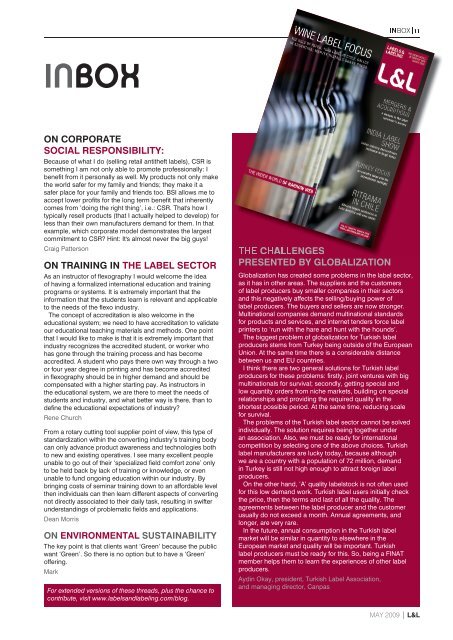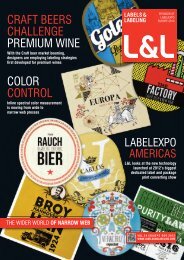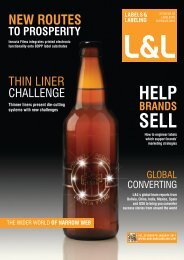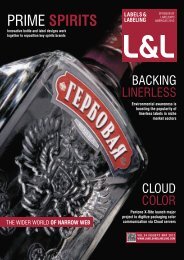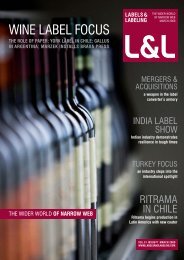THE DATA FRONT
Download as PDF - Labels & Labeling
Download as PDF - Labels & Labeling
- No tags were found...
You also want an ePaper? Increase the reach of your titles
YUMPU automatically turns print PDFs into web optimized ePapers that Google loves.
inBOX|11<br />
InbOx<br />
on corporate<br />
sociaL responsibiLity:<br />
Because of what I do (selling retail antitheft labels), CSr is<br />
something I am not only able to promote professionally: I<br />
benefit from it personally as well. My products not only make<br />
the world safer for my family and friends; they make it a<br />
safer place for your family and friends too. BSI allows me to<br />
accept lower profits for the long term benefit that inherently<br />
comes from ‘doing the right thing’, i.e.: CSr. That's how I<br />
typically resell products (that I actually helped to develop) for<br />
less than their own manufacturers demand for them. In that<br />
example, which corporate model demonstrates the largest<br />
commitment to CSr? Hint: It's almost never the big guys!<br />
Craig Patterson<br />
on training in tHe LabeL sector<br />
As an instructor of flexography I would welcome the idea<br />
of having a formalized international education and training<br />
programs or systems. It is extremely important that the<br />
information that the students learn is relevant and applicable<br />
to the needs of the flexo industry.<br />
The concept of accreditation is also welcome in the<br />
educational system; we need to have accreditation to validate<br />
our educational teaching materials and methods. one point<br />
that I would like to make is that it is extremely important that<br />
industry recognizes the accredited student, or worker who<br />
has gone through the training process and has become<br />
accredited. A student who pays there own way through a two<br />
or four year degree in printing and has become accredited<br />
in flexography should be in higher demand and should be<br />
compensated with a higher starting pay. As instructors in<br />
the educational system, we are there to meet the needs of<br />
students and industry, and what better way is there, than to<br />
define the educational expectations of industry?<br />
rene Church<br />
From a rotary cutting tool supplier point of view, this type of<br />
standardization within the converting industry’s training body<br />
can only advance product awareness and technologies both<br />
to new and existing operatives. I see many excellent people<br />
unable to go out of their ‘specialized field comfort zone’ only<br />
to be held back by lack of training or knowledge, or even<br />
unable to fund ongoing education within our industry. By<br />
bringing costs of seminar training down to an affordable level<br />
then individuals can then learn different aspects of converting<br />
not directly associated to their daily task, resulting in swifter<br />
understandings of problematic fields and applications.<br />
Dean Morris<br />
on environMentaL sustainabiLity<br />
The key point is that clients want ‘Green’ because the public<br />
want ‘Green’. So there is no option but to have a ‘Green’<br />
offering.<br />
Mark<br />
For extended versions of these threads, plus the chance to<br />
contribute, visit www.labelsandlabeling.com/blog.<br />
tHe cHaLLenges<br />
presented by gLobaLization<br />
Globalization has created some problems in the label sector,<br />
as it has in other areas. The suppliers and the customers<br />
of label producers buy smaller companies in their sectors<br />
and this negatively affects the selling/buying power of<br />
label producers. The buyers and sellers are now stronger.<br />
Multinational companies demand multinational standards<br />
for products and services, and internet tenders force label<br />
printers to ‘run with the hare and hunt with the hounds’.<br />
The biggest problem of globalization for Turkish label<br />
producers stems from Turkey being outside of the European<br />
union. At the same time there is a considerable distance<br />
between us and Eu countries.<br />
I think there are two general solutions for Turkish label<br />
producers for these problems: firstly, joint ventures with big<br />
multinationals for survival; secondly, getting special and<br />
low quantity orders from niche markets, building on special<br />
relationships and providing the required quality in the<br />
shortest possible period. At the same time, reducing scale<br />
for survival.<br />
The problems of the Turkish label sector cannot be solved<br />
individually. The solution requires being together under<br />
an association. Also, we must be ready for international<br />
competition by selecting one of the above choices. Turkish<br />
label manufacturers are lucky today, because although<br />
we are a country with a population of 72 million, demand<br />
in Turkey is still not high enough to attract foreign label<br />
producers.<br />
on the other hand, ‘A’ quality labelstock is not often used<br />
for this low demand work. Turkish label users initially check<br />
the price, then the terms and last of all the quality. The<br />
agreements between the label producer and the customer<br />
usually do not exceed a month. Annual agreements, and<br />
longer, are very rare.<br />
In the future, annual consumption in the Turkish label<br />
market will be similar in quantity to elsewhere in the<br />
European market and quality will be important. Turkish<br />
label producers must be ready for this. So, being a FInAT<br />
member helps them to learn the experiences of other label<br />
producers.<br />
Aydin okay, president, Turkish Label Association,<br />
and managing director, Canpas<br />
may 2009 | L&L


